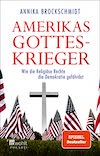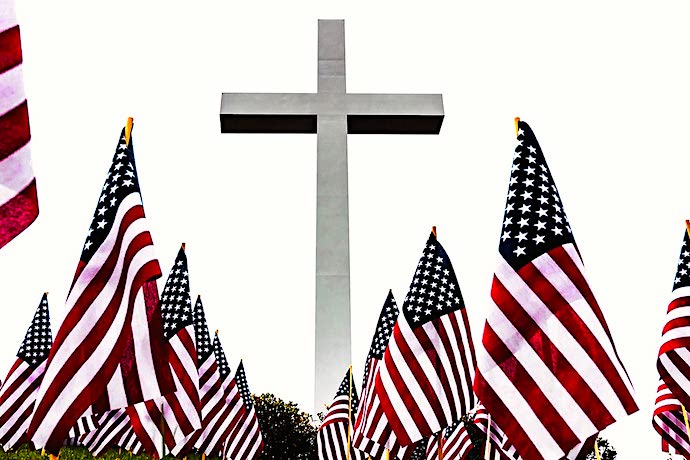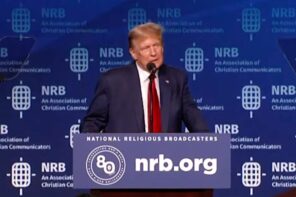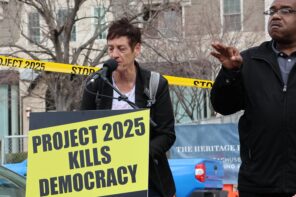“January 6 helped argue the case for fascist tendencies in Christian Nationalism,” Annika Brockschmidt tells me. As someone who spends his time on the front lines battling Christian Nationalism and writing about it, including a new epilogue on the January 6th insurrection, I of course agree. But I want to know why Brockschmidt in particular thinks so. I’m eager to hear her unique, international perspective. Is America slouching towards Christian fascism?

Amerikas Gotteskrieger: Wie die Religiöse Rechte die Demokratie gefährdet
Annika Brockschmidt
Rowohlt Taschenbuch
October, 2021
Early on in the conversation we bonded over a shared pet peeve, one RD writers like Chrissy Stroop and Andre Key have dispensed with. Brockschmidt observes that “When you write about Christian nationalism, you very quickly arrive at the ‘but these are not real Christians,’ fallacy.” People may agree that “Christian Nationalism is a bad thing, but then wonder, ‘can you really call it Christian? They’re not real Christians.’ I get that reflex, it’s a good reflex to say that ‘white supremacists are not my people,’ but this fallacy, though it can be painful for that group, is something that needs sober analysis.” When I point out that the flip side of this fallacy is that anything a Christian does must also be good, she agrees, adding: “it’s a nice fallacy to have, really useful.”

Author Annika Brockschmidt. Image from the author’s Twitter feed @ardenthistorian.
The Gotteskrieger in her book’s title has a connotation in German that doesn’t come through in the above translation. The word, Brockschmidt tells me, as used in the German press, refers to Islamic fundamentalists and terrorists such as the Taliban and al Qaeda. “I don’t assert this name on their behalf, this is the name American Christian Nationalists, particularly the more extreme ones, give themselves.”
This “militant masculinity” strain of Christianity, recently described by Kristin Kobes Du Mez in Jesus and John Wayne and earlier by Jeff Sharlet and others, “is steeped in Christian Nationalism. … The title is supposed to convey the aggression that is behind this movement,” says Brockschmidt. That rhetoric was particularly virulent in the lead up to, and on, January 6th. On their march to the Capitol that day, the crowd hailed the Proud Boys as “God’s Warriors.”
The book is already in a second printing, so clearly there’s an appetite for understanding America’s slide toward fascism. But why are Germans so interested? “Germans have had a hard time understanding what’s going on in the US; most probably don’t know about the homegrown fascist movement, and, in a sense, how could they? We remember a United States that fought the Nazis,” she explains.
Brockschmidt is careful about drawing comparisons between the US now and the rise of Nazism in Germany in the 1930s. It’s such a severe and somber charge, “Germans are hypervigilant when it comes to fascist movements, but also protective of when the term is used,” she explains. In the end, Brockschmidt is willing to go there precisely because the comparisons are apt. When I ask, “Do you think that analogies to 1930s Germany are overblown?” She pauses thoughtfully then answers, “I don’t think they’re overblown.” She brought the receipts to our interview.
Brockschmidt lists several signals, structures and characteristics of American Christian Nationalism that overlap in worrying ways with fascism. The “myth of a golden past,” is a big one. “[Calling for a return to] how the country used to be when in fact it’s a version that never was. It’s used to divide the country into us and them.” I found this particularly interesting because it goes to the heart of Christian Nationalism—attempting to return America to a Christian nation that never existed. As I’ve written elsewhere, America can never be a Christian nation because the moment it becomes a Christian nation it will cease to be America.
Alongside this myth is the tendency to paint outgroups as “not real Americans.” A third marker is the veneration of “law and order, which really just means being tough on a certain portion of the population, not on crime.” Brockschmidt also mentions other “dog whistles used to stoke fear, resentment, and anger against outgroups [in order] to strengthen the feeling of togetherness of [the] ingroup.” Another marker of incipient fascism is “anti-intellectualism,” which can be seen in the “crusade in universities against wokeness and against critical race theory,” and, more broadly, against science, vaccines, and the pandemic itself.
One marker that interested me in particular was the “creation of unreality or a separate reality,” as she put it, because we’re living in a disinformation age. The Trump era was—or is, depending on how you mark its boundaries—the era of alternative facts, founding myths, the Big Lie, and QAnon. That observation strikes a chord for Brockschmidt because “QAnon is the 2021 version of the blood libel,” a chilling observation given her credentials. “Blood libel refers to the false allegation that Jews used the blood of non-Jewish, usually Christian, children, for ritual purposes. The Nazis made effective use of the blood libel to demonize Jews,” according to the US Holocaust Memorial Museum. Brockschmidt says, “This narrative is returning, being recycled.”
“As a German historian,” Brockschmidt tells me, “the authoritarian and fascistic tendencies in American Christian Nationalism make me very uneasy.” There’s a distinct direction that Christian Nationalism is going,” she notes, adding that “it’s not going to go away, and it seems to have picked up steam since Trump lost.” I’ve noticed this trend too. Adopting the Big Lie seems to have removed the last fig leaf of reality, “they are now back in a more comfortable role: ‘the persecuted.’”
After an informative, depressing hour, we turn to solutions. What can Americans do to stop this slide toward fascism? The answer surprises me somewhat. “Unless there is a public reckoning with American exceptionalism and what that means for how you see history and the country itself, it’s going to be hard to have a meaningful conversation about this.” As someone who wrote a book on the reality of American history, it’s easy for me to agree. She adds, “The belief that America is inherently good. That’s problematic framing.” That it mirrors the “fake Christian” fallacy discussed earlier isn’t lost on me.
In the end, for Christian nationalists the logic is simple, if twisted: if America is a Christian nation, by definition it’s good, so the morality and history and consequences don’t matter; Christian equals good, so not Christian equals bad.
The quote that keeps coming back to me as I think about this interview is from the incomparable James Baldwin: “I love America more than any other country in the world and, exactly for this reason, I insist on the right to criticize her perpetually.” It should come as no surprise that, although he ultimately left it behind, Baldwin was also able to both love and criticize the religion of his youth.
*Brockschmidt and her publisher are currently in discussions for an English translation of her book.





